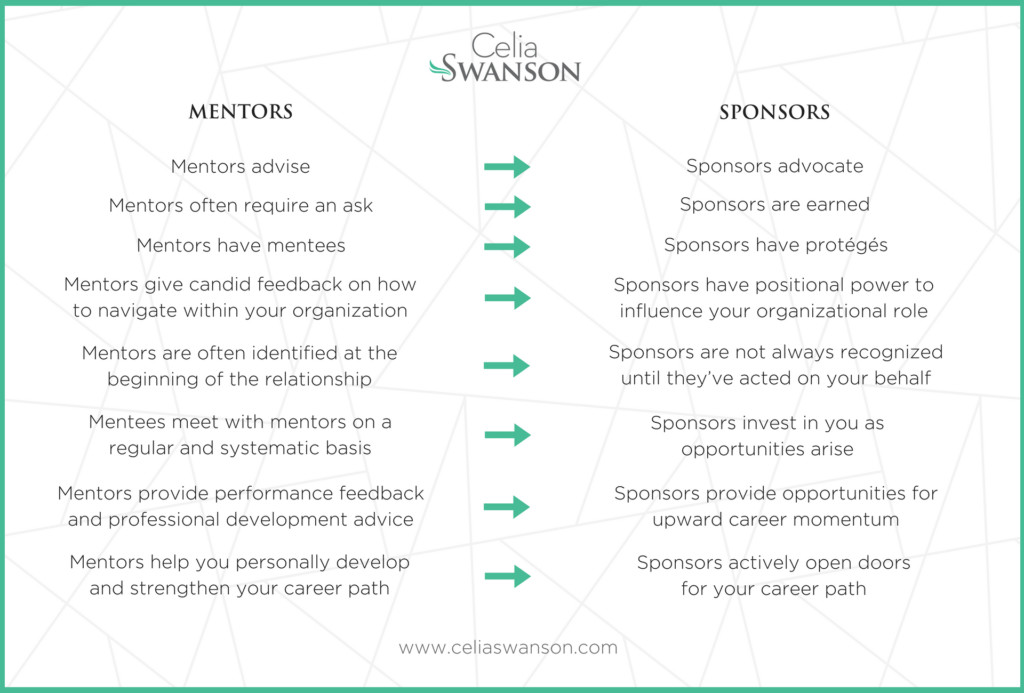
If you’ve ever had the perfect mentor, you know how essential that relationship can be for your growth. These trusted guides will often give you the candid, most invaluable advice that’s essential for overcoming the toughest career hurdles.
In an earlier blog post, I shared the importance of finding (and keeping) the perfect mentor. I also have a free download that tells you how to craft a mentor ask. This week, I’d like to share more about career sponsorship and the difference between the two.
I can’t stress enough the importance of having both mentors and sponsors. It’s what took my career to a completely different level, allowing me to lead at my optimum capacity and pursue a rewarding career at Walmart Inc.
As you read this article, I encourage you to think about how to leverage both support roles in order to achieve your highest ambitions.
The Difference
Mentor – A mentor provides advice and support but is different than a sponsor. They are your trusted ‘behind-the-scenes’ guide giving you a safe place to seek candid advice and insight you wouldn’t receive otherwise.
As Sylvia Ann Hewlett, author of ‘Forget a Mentor, Find a Sponsor,’ puts it, “Mentors advise, sponsors act.”
Sponsor – A sponsor is very different from a mentor. A sponsor uses his or her organizational influence to advocate for individuals when making stretch-assignment decisions and promotion decisions.
Sponsor relationships take time to develop and come to those the leader knows well. Think of them as a ‘guardian angel’ helping you find opportunity along the way.
There is also a hard side to sponsorship, which requires using tough love and honest and direct feedback on a regular basis. They have to share with you the reality of how you’re perceived and the truth about your potential.
As an added benefit, sponsorship is also key to increasing the representation of women in “feeder” positions for senior-executive roles. This promotes diverse talent-succession pipelines for the most critical positions identified in organizations.
So how do you leverage both mentors and sponsors in order to effectively reach your goals? Here are a few tips:
LEVERAGING A MENTOR
When it comes to developing relationships with mentors, they must know you have skin in the game. If the burden rests on mentors, mentees may never achieve what they truly want from the relationship.
You have to know what you want going into the ask. Share your obstacles, your goals and how their leadership traits can help get you where you want to go. Tell them:
- Why they are the individual you’re selecting,
- How their leadership traits can help you move forward, and
- Specific goals and obstacles they can help you achieve.
Mentor relationships can also evolve into sponsorships. I’ve seen this happen where an individual has a mentor that gets promoted to a role influencing the mentee’s career. This is a beautiful thing because the relationship has already been established and the ‘new sponsor’ has the ability to advocate for them where it counts.
LEVERAGING A SPONSOR
There’s never a true ask when it comes to securing a sponsor. In other words, they pick you based on your potential and working relationship. Sponsors tend to be less available to meet on a regular basis like a mentor. They also typically partner with and support those they see as high-potential leaders.
Positioning yourself for a career sponsor starts with identifying and building relationships with a leader who has the positional power to create opportunities for further growth and exposure. The sponsor then determines if they will support you based on whether or not they see more potential in you than the role you’re currently filling in the company.
INSIDE TIP: A mentor can also help you gauge how your potential might be perceived. They can also share insight on how to navigate the politics of an organization to obtain sponsorship.
It’s important to also note that simply keeping your head down and being a ‘hard worker’ will not catch the eye of a potential sponsor. Sponsors love go-getters who can lift their head up and go above and beyond what’s expected.
Here is a chart that best summarizes the key differentiators of mentors and sponsors.

CELIA CASE STUDY — WINNING WITH SPONSORSHIP
You may not always recognize a sponsor until you look back on your wins.
In my own career, a breakthrough moment occurred when I was promoted from vice president to senior vice president. I had been recruited and hired by an exceptional woman who had asked me to join Sam’s Club after observing me lead during its acquisition of PACE.
When she made the personal decision to leave Sam’s Club, she submitted my name as her backfill. I went through the necessary leadership approvals and was offered the role of SVP, responsible for all the support functions at Sam’s Club.
Although I didn’t immediately recognize her as a sponsor at the time, Suzanne definitely served as one. Her influence significantly increased my visibility in the organization and I may never have earned the role without her advocacy and support.
The same can happen for you. What are some key authentic relationships you can build with mentors and sponsors in order to achieve your goals? You will find that these relationships are key to succeeding not only in business, but in every area of life. More importantly, they will shape you as a leader for years to come.

